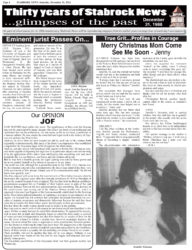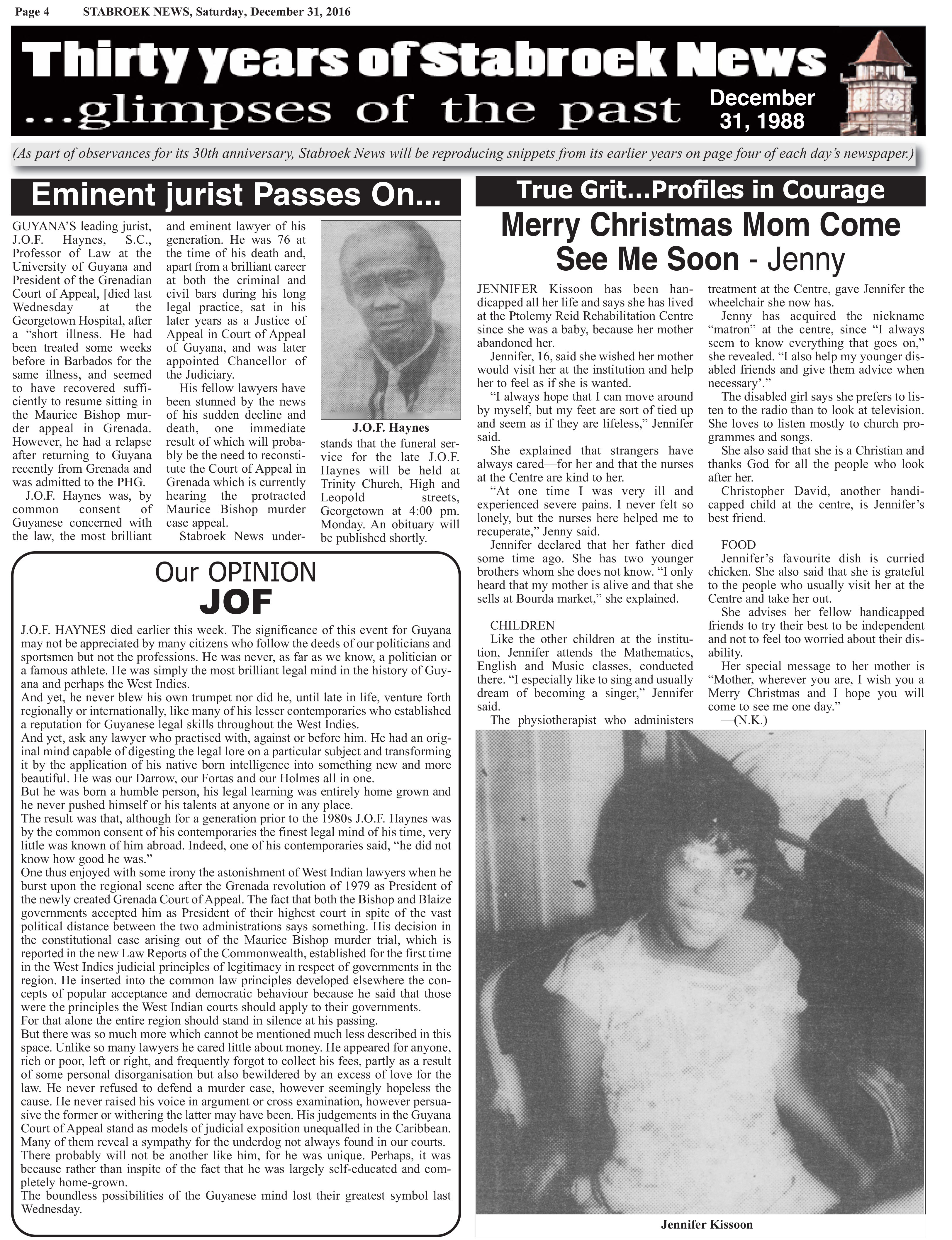Eminent jurist Passes On…
GUYANA’S leading jurist, J.O.F. Haynes, S.C., Professor of Law at the University of Guyana and President of the Grenadian Court of Appeal, [died last Wednesday at the Georgetown Hospital, after a “short illness. He had been treated some weeks before in Barbados for the same illness, and seemed to have recovered sufficiently to resume sitting in the Maurice Bishop murder appeal in Grenada. However, he had a relapse after returning to Guyana recently from Grenada and was admitted to the PHG.
J.O.F. Haynes was, by common consent of Guyanese concerned with the law, the most brilliant and eminent lawyer of his generation. He was 76 at the time of his death and, apart from a brilliant career at both the criminal and civil bars during his long legal practice, sat in his later years as a Justice of Appeal in Court of Appeal of Guyana, and was later appointed Chancellor of the Judiciary.

Stabroek News understands that the funeral service for the late J.O.F. Haynes will be held at Trinity Church, High and Leopold streets, Georgetown at 4:00 pm. Monday. An obituary will be published shortly.
Our OPINION
JOF
J.O.F. HAYNES died earlier this week. The significance of this event for Guyana may not be appreciated by many citizens who follow the deeds of our politicians and sportsmen but not the professions. He was never, as far as we know, a politician or a famous athlete. He was simply the most brilliant legal mind in the history of Guyana and perhaps the West Indies.
And yet, he never blew his own trumpet nor did he, until late in life, venture forth regionally or internationally, like many of his lesser contemporaries who established a reputation for Guyanese legal skills throughout the West Indies.
And yet, ask any lawyer who practised with, against or before him. He had an original mind capable of digesting the legal lore on a particular subject and transforming it by the application of his native born intelligence into something new and more beautiful. He was our Darrow, our Fortas and our Holmes all in one.
But he was born a humble person, his legal learning was entirely home grown and he never pushed himself or his talents at anyone or in any place.
The result was that, although for a generation prior to the 1980s J.O.F. Haynes was by the common consent of his contemporaries the finest legal mind of his time, very little was known of him abroad. Indeed, one of his contemporaries said, “he did not know how good he was.”
One thus enjoyed with some irony the astonishment of West Indian lawyers when he burst upon the regional scene after the Grenada revolution of 1979 as President of the newly created Grenada Court of Appeal. The fact that both the Bishop and Blaize governments accepted him as President of their highest court in spite of the vast political distance between the two administrations says something. His decision in the constitutional case arising out of the Maurice Bishop murder trial, which is reported in the new Law Reports of the Commonwealth, established for the first time in the West Indies judicial principles of legitimacy in respect of governments in the region. He inserted into the common law principles developed elsewhere the concepts of popular acceptance and democratic behaviour because he said that those were the principles the West Indian courts should apply to their governments.
For that alone the entire region should stand in silence at his passing.
But there was so much more which cannot be mentioned much less described in this space. Unlike so many lawyers he cared little about money. He appeared for anyone, rich or poor, left or right, and frequently forgot to collect his fees, partly as a result of some personal disorganisation but also bewildered by an excess of love for the law. He never refused to defend a murder case, however seemingly hopeless the cause. He never raised his voice in argument or cross examination, however persuasive the former or withering the latter may have been. His judgements in the Guyana Court of Appeal stand as models of judicial exposition unequalled in the Caribbean. Many of them reveal a sympathy for the underdog not always found in our courts.
There probably will not be another like him, for he was unique. Perhaps, it was because rather than inspite of the fact that he was largely self-educated and completely home-grown.
The boundless possibilities of the Guyanese mind lost their greatest symbol last Wednesday.
True Grit…Profiles in Courage
Merry Christmas Mom Come See Me Soon – Jenny
JENNIFER Kissoon has been handicapped all her life and says she has lived at the Ptolemy Reid Rehabilitation Centre since she was a baby, because her mother abandoned her.
Jennifer, 16, said she wished her mother would visit her at the institution and help her to feel as if she is wanted.
“I always hope that I can move around by myself, but my feet are sort of tied up and seem as if they are lifeless,” Jennifer said.
She explained that strangers have always cared—for her and that the nurses at the Centre are kind to her.
“At one time I was very ill and experienced severe pains. I never felt so lonely, but the nurses here helped me to recuperate,” Jenny said.
Jennifer declared that her father died some time ago. She has two younger brothers whom she does not know. “I only heard that my mother is alive and that she sells at Bourda market,” she explained.
CHILDREN
Like the other children at the institution, Jennifer attends the Mathematics, English and Music classes, conducted there. “I especially like to sing and usually dream of becoming a singer,” Jennifer said.
The physiotherapist who administers treatment at the Centre, gave Jennifer the wheelchair she now has.
Jenny has acquired the nickname “matron” at the centre, since “I always seem to know everything that goes on,” she revealed. “I also help my younger disabled friends and give them advice when necessary’.”
The disabled girl says she prefers to listen to the radio than to look at television. She loves to listen mostly to church programmes and songs.
She also said that she is a Christian and thanks God for all the people who look after her.
Christopher David, another handicapped child at the centre, is Jennifer’s best friend.
FOOD
Jennifer’s favourite dish is curried chicken. She also said that she is grateful to the people who usually visit her at the Centre and take her out.
She advises her fellow handicapped friends to try their best to be independent and not to feel too worried about their disability.
Her special message to her mother is “Mother, wherever you are, I wish you a Merry Christmas and I hope you will come to see me one day.”
—(N.K.)


